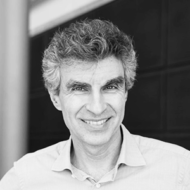
Yoshua Bengio
La nomination
Responsable de comité consultatif
Titulaire de chaire en IA Canada-CIFAR
Apprentissage automatique, apprentissage biologique
Stratégie pancanadienne en matière d’IA
Connect
À Propos
Titulaire de chaire en IA Canada-CIFAR – Nouveau mandat – 2018
Titulaire de chaire en IA Canada-CIFAR – Mandat renouvelé – 2023
Reconnu comme l’une des sommités mondiales en intelligence artificielle, Yoshua Bengio s’est surtout distingué par son rôle de pionnier en apprentissage profond, ce qui lui a valu le Prix A.M. Turing 2018, le « prix Nobel de l’informatique », avec Geoffrey Hinton et Yann LeCun.
Il est professeur titulaire à l’Université de Montréal, fondateur et directeur scientifique de Mila – Institut québécois d’IA, et codirige le programme Apprentissage automatique, apprentissage biologique de CIFAR en tant que Senior Fellow. Il occupe également la fonction de directeur scientifique d’IVADO.
En 2019, il se voit décerner le prestigieux prix Killam. En 2021, il se classe au deuxième rang des informaticiens les plus cités dans le monde. Il est Fellow de la Royal Society de Londres et du Société Royale du Canada, et Officier de l’Ordre du Canada.
Préoccupé par l’impact social de l’IA et l’objectif que l’IA bénéficie à tous, il a activement contribué à la Déclaration de Montréal pour le développement responsable de l’intelligence artificielle.
Prix
- Lauréat du prix A.M. Turing 2018
- Codirecteur du programme Apprentissage automatique, apprentissage biologique de CIFAR
- Titulaire de chaire en IA Canada-CIFAR
- Membre du conseil d'administration de la Frontier AI Taskforce du Royaume-Uni
- Membre du Conseil scientifique consultatif des Nations unies pour un avis indépendant sur les percées scientifiques et technologiques
- Lauréat du prix Killam en sciences Naturelles 2019
- Fellow de la Société royale de Londres 2020
- Fellow de la Société royale de Londres 2017
- Officier de l’Ordre du Canada 2017
- IEEE CIS Neural Networks Pioneer award 2019
- Professeur titulaire, département d’informatique et de recherche opérationnelle, UdeM
- Fondateur et directeur scientifique de Mila
- Directeur scientifique d’IVADO
Publications Pertinentes
- Goodfellow, Ian J., Yoshua Bengio, and Aaron Courville (2016). Deep Learning. MIT Press.
- Bahdanau, Dzmitry, Kyunghyun Cho, and Yoshua Bengio (2015). “Neural Machine Translation by Jointly Learning to Align and Translate”. In: ICLR’2015, arXiv:1409.0473.
- LeCun, Yann, Yoshua Bengio, and Geoffrey Hinton (2015). “Deep Learning”. In: Nature 521.7553, pp. 436–444.
- Dauphin, Yann, Razvan Pascanu, Caglar Gulcehre, Kyunghyun Cho, Surya Ganguli, and Yoshua Bengio (2014). “Identifying and attacking the saddle point problem in high-dimensional non-convex optimization”. In: NIPS’2014, arXiv:1406.2572.
- Montufar, Guido F., Razvan Pascanu, KyungHyun Cho, and Yoshua Bengio (2014). “On the Number of Linear Regions of Deep Neural Networks”. In: NIPS’2014, arXiv:1402.1869.
- Goodfellow, Ian J., Jean Pouget-Abadie, Mehdi Mirza, Bing Xu, David Warde-Farley, Sherjil Ozair, Aaron Courville, and Yoshua Bengio (2014). “Generative Adversarial Networks”. In: NIPS’2014, arXiv:1406.2661.
- Pascanu, Razvan, Guido Montufar, and Yoshua Bengio (2014). “On the number of inference regions of deep feed forward networks with piece-wise linear activations”. In: International Conference on Learning Representations 2014 (Conference Track),arXiv:1305.6663.
- Yoshua Bengio, Li Yao, Guillaume Alain, and Pascal Vincent (2013). “Generalized Denoising Auto-Encoders as Generative Models”. In: NIPS’2013, arXiv:1305.6663.
- Glorot, X., A. Bordes, and Y. Bengio (2011). “Deep Sparse Rectifier Neural Networks”. In: AISTATS’2011
- Glorot, Xavier and Yoshua Bengio (2010). “Understanding the difficulty of training deep feedforward neural networks”. In: AISTATS’2010.
- Bengio, Yoshua, Jerome Louradour, Ronan Collobert, and Jason Weston (2009). “Curriculum Learning”. In: ICML’09, 2009_curriculum_icml.
- Bengio, Yoshua (2009). “Learning deep architectures for AI”. In: Foundations and Trends in Machine Learning 2.1, pp. 1–127.
- Pascal Vincent, Hugo Larochelle, Yoshua Bengio, and Pierre-Antoine Manzagol (2008). “Ex-tracting and Composing Robust Features with Denoising Autoencoders”. In: Proceedings of the Twenty-fifth International Conference on Machine Learning (ICML’08). Ed. by William W. Cohen, Andrew McCallum, and Sam T. Roweis. ACM, pp. 1096–1103.
- Bengio, Yoshua, Pascal Lamblin, Dan Popovici, and Hugo Larochelle (2007). “Greedy Layer-Wise Training of Deep Networks”. In: NIPS’2006. Ed. by Bernhard Schölkopf, John Platt, and Thomas Hoffman. MIT Press, pp. 153–160.
- Bengio, Y., Delalleau, O., Le Roux, N. (2005) “The Curse of Highly Variable Functions for Local Kernel Machines”. NIPS’2005
- Yoshua Bengio, Réjean Ducharme, Pascal Vincent, and Christian Jauvin (2003). “A Neural Probabilistic Language Model”. In: Journal of Machine Learning Research 3, pp. 1137– 1155.
- Bengio, Yoshua and Samy Bengio (2000). “Modeling High-Dimensional Discrete Data with Multi-Layer Neural Networks”. In: Advances in Neural Information Processing Systems 12 (NIPS’99). Ed. by S.A. Solla, T.K. Leen, and K-R. Müller. MIT Press, pp. 400–406.
- LeCun, Yann, Leon Bottou, Yoshua Bengio, and Patrick Haffner (1998). “Gradient-Based Learning Applied to Document Recognition”. In: Proceedings of the IEEE 86.11, pp. 2278– 2324.
- Bengio, Y., P. Simard, and P. Frasconi (1994). “Learning Long-Term Dependencies with Gradient Descent is Difficult”. In: IEEE Transactions on Neural Networks 5.2, pp. 157– 166.
- Bengio, Yoshua, Samy Bengio, Jocelyn Cloutier, and Jan Gecsei (1991). “Learning a Synaptic Learning Rule”. In: International Joint Conference on Neural Networks (IJCNN). Seattle, WA, II–A969.